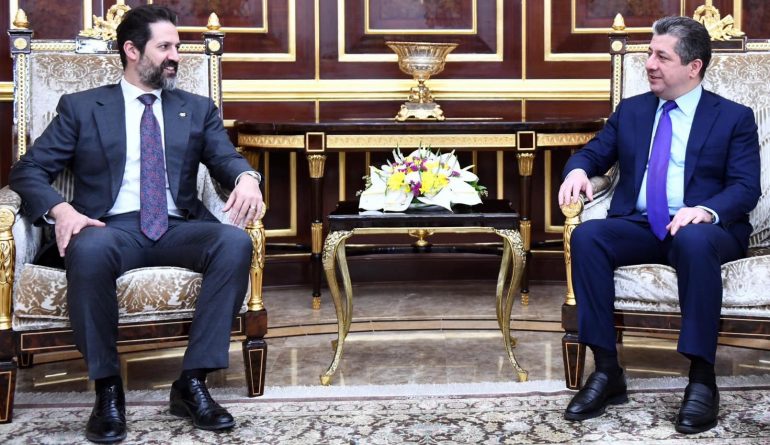On Monday, a surprise meeting between Kurdistan Regional Government (KRG) Prime Minister Masrour Barzani and Deputy PM Qubad Talabani indicated a renewal of dialogue between the dominant KDP and PUK parties after months of tense relations.
The meeting likely stemmed from a recent visit by United States Assistant Secretary of State for Near Eastern Affairs Barbara A. Leaf to the Kurdistan Region of Iraq (KRI), rather than an internal effort. She met with government and party leaders, urging the press to concentrate on resolving pressing issues and prioritizing national interests.
Rewind 25 years and different US officials were involved. But the same Kurdish surnames dominated headlines. In 1998, the Associated Press filed a story titled Iraqi Kurd Leaders Agree to Establish Elected Government, reporting that Masoud Barzani, leader of the Kurdistan Democratic Party, and Jalal Talabani, head of the Patriotic Union of Kurdistan, had met for the first time in four years, brought together by a US-brokered initiative.
Despite significant global changes and numerous transitions in the Oval Office over time, it was the sons of those two Kurdish leaders who recently met again under the shadow of US mediation. Although the current situation is not a civil war, concerns are growing that recent security incidents and a lack of dialogue could escalate into full-scale conflict.
Before Monday’s meeting, rumors circulated that Leaf had warned KRI political leaders that the United States might withdraw support if the ruling parties failed to resolve their differences. The US’s paternalistic approach remains consistent with its actions 25 years ago, despite significantly different circumstances.
The 1998 Washington Agreement was brokered by then-US Secretary of State, the late Madeleine Albright. She is seen in AP footage encouraging the two Kurdish leaders to shake hands. A month later, US President Bill Clinton signed the Iraq Liberation Act, providing military aid to Iraqi opposition groups, including the KDP and PUK. This peace agreement likely came as a condition for such support.
Twenty five years have passed, and the leadership of the PUK and KDP has transitioned to the next generation of Talabanis and Barzanis, respectively. Despite the passage of time, the two parties still seem unable to resolve their disputes, with leaderships exhibiting a level of stubbornness that may even surpass that of their fathers.
The Prime Minister and his deputy continue to rely on foreign assistance to maintain Kurdish unity, much like their predecessors. Without the US emphasising Kurdish national interests, which regional actor would step in?
The KRI lacks an internally respected leader capable of settling ongoing disputes. PUK’s former leader Jalal Talabani, who suffered a stroke in late 2012 and died in 2017, became such a figure for Kurds and Iraq as a whole during his later years as Iraqi President. KDP supporters view long-time leader and former Kurdistan Region President Masoud Barzani as their nation’s marja, a wise and authoritative leader. However, Barzani’s inability to resolve local disputes and his KDP party’s inflexibility prevent him from truly embodying this role.
The US has grown increasingly frustrated with KRI leaders who fail to resolve issues of national importance, instead focusing on trivial details rather than the bigger picture. US involvement primarily aims for a strong KRG within a united, federal, democratic Iraq, and distanced from Iran’s influence. However, having to resort to foreign mediation highlights the KRI’s lack of a credible, authoritative (as opposed to authoritarian) leader to navigate these challenges.
KDP deputy leader and current Kurdistan Region President Nechirvan Barzani, entrusted with safeguarding the region’s territorial unity, has consistently endeavored to embody reason, compromise, and national unity. However, his efforts at statesmanship appear in vain, as his influence has been significantly diminished by cousin Masrour Barzani. The latter is the KDP’s other deputy leader and head of the more partisan, more powerful faction. Masrour has managed to gradually wrestle control of the party away from Nechirvan, a process that began in earnest as IS approached the gates of Kurdistan in 2014 and military power became the prevailing local currency.
It has become glaringly obvious that the Kurdistan Region lacks an internal figure who is both willing and, most importantly, able to provide genuine leadership. The ongoing reliance on US mediation underscores the need for a strong, authoritative figure to emerge from within the KRI’s political landscape. Until such a leader arises, the region’s stability and unity will continue to depend on external intervention, leaving its future uncertain and its potential unfulfilled.


